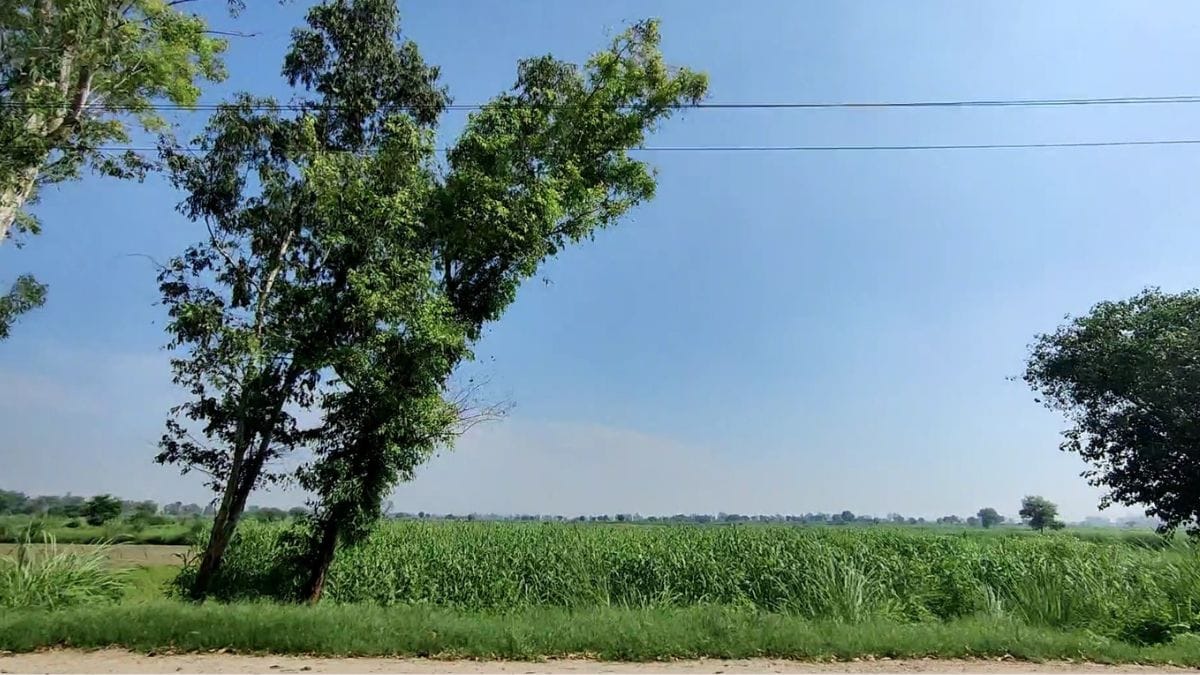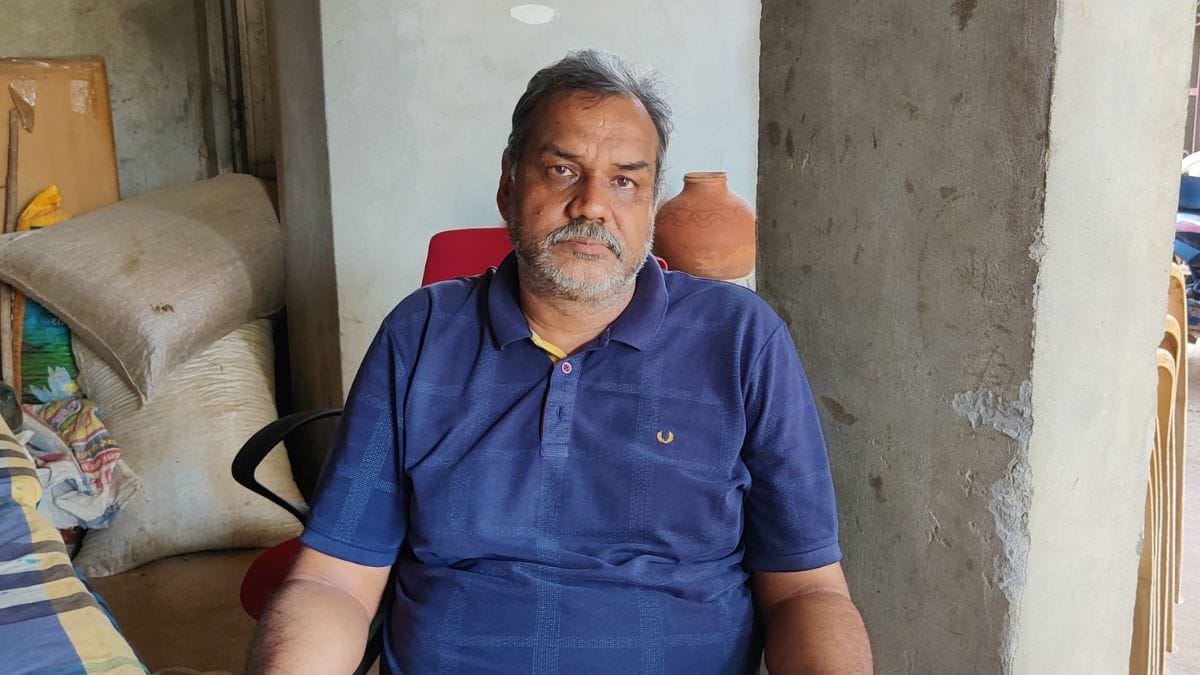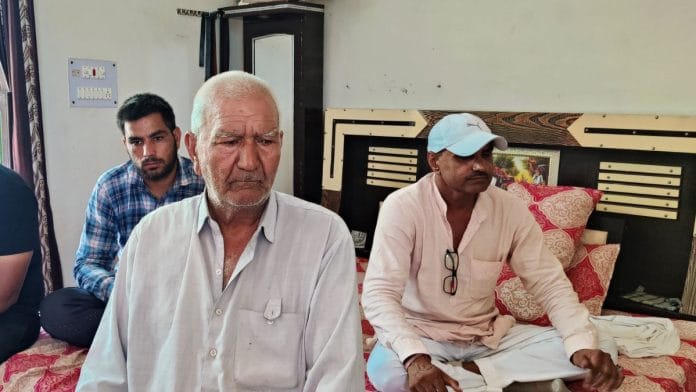Charkhi Dadri (Haryana): On the intervening night of 2 and 3 July, Vikram Sangwan attempted suicide by hanging himself from the ceiling of his home in Charkhi village in Haryana’s Charkhi Dadri district. The 28-year-old said he was driven to take such a step due to the “humiliation” brought on by the social boycott imposed on his family at the behest of the khap panchayat.
His is among the nine families in the village facing a ‘hukka paani band’, or a complete boycott, for “disobeying” the khap’s order banning the sowing of the paddy crop which leads to waterlogging in the village.
Vikram was found by his mother and rushed to the Charkhi Dadri civil hospital and later shifted to a hospital in Rohtak, where the police recorded his statement.
“When the Khap Panchayat pronounced its diktat against us on 2 July, it was humiliating,” Vikram told ThePrint.
“Later that day, my friends from the village, who I would usually gossip and crack jokes with, ignored me as they walked by the main gate of my residence. Then, when I went to a shop near our home to buy groceries, the shopkeeper refused to sell anything to me citing the khap panchayat’s orders. This was all very depressing and distressing. I thought to myself, how am I going to spend my life here in this village? What is the point of such a life?” he added.
ThePrint visited Charkhi Thursday to assess how the ban has affected the village.
Located six kilometers from Charkhi Dadri city, the district headquarters, the village is sandwiched between two canals—the Indira Gandhi Canal and the Kitlana Minor. Driving towards Charkhi, one is greeted by the lush green paddy fields on the left, and withering cotton crop on the right.

The nine paddy-growing families now live in a state of constant fear. Speaking to ThePrint, the women from these families said they are always anxious about the well-being of their men who go out to work in the fields daily.
Meanwhile, the shopkeepers ThePrint spoke to in the village said they feel like they have “no option” but to follow the khap panchayat’s diktat.
“The sarpanch specifically called me and asked me to make sure that nothing is sold to the families facing boycott since my shop is very close to their homes,” said Ram Kishan when ThePrint visited his shop.
Khap Panchayats, largely prevalent among Jat the community in Haryana and Western Uttar Pradesh, are gotra (clan) based panchayats with no statutory or constitutional force behind them. The Sangwan Khap, which issued the diktat, has 40 villages under it and is headed by Sombir Sangwan, an Independent MLA from Charkhi Dadri.
Sombir Sangwan, who also hails from Charkhi, has expressed his support for the state’s Bharatiya Janata Party (BJP) government led by Manohar Lal Khattar. He was also among the four independent MLAs who met BJP’s state in-charge Biplab Kumar Deb last month to express their support for Khattar after relations between BJP and ally Jannayak Janta Party (JJP) seemed to reach a flashpoint.
On 7 May, a meeting of the khap panchayat presided by MLA Sombir Sangwan and village sarpanch Bhupinder Sangwan was held in Charkhi, where an order banning the plantation of paddy was issued, ThePrint has learnt.
The khap panchayat also issued the diktat that anyone who disobeys the orders will face complete boycott, i.e. no villager would speak to them and no shopkeeper would sell them anything.
In another meeting of the Khap Panchayat held on 2 July, the social boycott against nine families who had disregarded the paddy ban was announced, families in the village told ThePrint. The boycotted families all belong to the Sangwan gotra.
Kuldeep Sangwan, head of one of the affected families, along with some others, has filed a writ petition in the Punjab and Haryana High Court, accusing members of the khap panchayat of threatening the families with “dire consequences” for disobeying them. They have also accused the local police and authorities in the petition of failure to provide justice and have demanded that a special investigation team (SIT) be set up comprising “officers of impeccable integrity not below the rank of IG (inspector general) from outside Charkhi Dadri district” to ensure a free and fair investigation.
ThePrint has seen a copy of the petition.
In a conversation with ThePrint, though, Sombir Sangwan denied having announced a boycott of any sort.
“The complaints about the social boycott are absolutely false,” he said. “The villagers have been following a collective decision to not sow paddy to save their houses from waterlogging and other issues stemming from the use of pesticides used on paddy. But no one has forced anyone to uproot paddy from their fields,” said Sangwan.
The HC has issued notices, which ThePrint has seen, to Sombir Sangwan, Sarpanch Bhupinder Sangwan, Charkhi Dadri Dadri Superintendent of Police (SP) Nikita Gahlaut and four other members of the khap panchayat, informing them that the petition has been fixed for hearing on 4 August.
Speaking to ThePrint about Vikram’s attempted suicide, SP Gahlaut said, “He could have been booked under Section 309 of the IPC, but the police exhibited leniency thinking the victim must already be distressed.”
Also read: This paddy cultivation technique is Punjab govt’s answer to ‘save water, avoid crisis’
Why the khap has banned cultivation of paddy
Charkhi Sarpanch Bhupinder Sangwan told ThePrint that the ban on paddy is “not new” and has been in force for the past 12 years, adding that the village has collectively been taking this decision year after year to prevent flooding.
“Ours is not a paddy area like Karnal, Kaithal, Kurukshetra, Fatehabad, or Sirsa,” he said. “Some families steal water from the two canals flowing on both sides of the village and sow paddy, but the entire village has to suffer the consequences since the cultivation of paddy has led to an increase in the water table of the village over the years, leading to flooding of the village.”
So, when it rains, the water tends to flow from the paddy fields — already flooded with the water required to irrigate the crop — towards the houses.

According to Bhupinder Sangwan, Charkhi is “low-lying” and its water table is very high.
“Even during April and May, considered dry months, one can get water in our village by just digging up to five to six meters,” he said. “Today, 30 to 35 motors are working in our village to drain out rainwater that has accumulated in the streets. If all farmers plant paddy, the entire village will be flooded because of choya chalna (horizontal movement of subsoil water, or lateral flow).”
He, too, denied having announced any social boycott against paddy growing families. He said that it is common practice for families here to stop speaking to anyone going against this common decision to not cultivate paddy in order to “teach them a lesson”.
However, the paddy farmers ThePrint spoke to said that they grow the crop since the land in Charkhi is “well-suited” for it.
“Just look at the crop…it is grown by some villagers because of the khap panchayat’s diktat, but it has almost withered away because of the standing water. By the time harvesting season for cotton will come, there will be no plants left on the fields because cotton crops can’t tolerate stagnant water for long. This is the reason we have planted PB-1121 variety of Basmati paddy so that we can get good return on our produce,” said Vikram.
According to Vikram, the local MLA and the sarpanch, who represent prominent families of the village, “don’t like common farmers like (him) to earn profits”.
“Those who have sown cotton will eventually lose their entire crop and will be at the mercy of Sombir Sangwan and sarpanch Bhupinder Sangwan for compensation for crop loss from the government. This suits their political interests,” said Raj Kumar Sangwan, another farmer affected by the Khap Panchayat’s diktat.
Another paddy farmer Hans Raj, better known in the village as Hansa Pehalwan, said that there is no logic in stopping villagers from planting paddy. “The Sarpanch and Sombir Sangwan have just made this issue a mooch ka sawal (matter of pride),” he said.
‘Internal issue of the village’
Speaking to ThePrint, Deepak Sangwan, an advocate in Charkhi Dadri district courts who is helping the families that have filed the writ petition, alleged that the police are under pressure from Sombir and are refusing to act on complaints by paddy growing farmers.
According to Deepak, on 10 May the petitioner Kuldeep Sangwan and 13 others met SP Gahlaut with the complaint that Sombir, Bhupinder Sangwan and their supporters were creating an atmosphere of threat and fear. “On 30 May, the SHO Sadar, who was asked to enquire about the matter by the SP, submitted a report that no one has so far stopped Kuldeep Sangwan and other families from sowing paddy, and if such a situation arises in the future, they can file a complaint,” said Deepak.
“On 30 June, when my client went to his fields with equipment, they were threatened with dire consequences by the Sarpanch and his supporters. Immediately, my clients moved another application on 1 July before the SP seeking protection, but the next day, another Khap Panchayat was held on 2 July, announcing the ex-communication of my clients and other families who have sown paddy on their fields. No action has been taken by the police so far,” he added.
However, SP Gahalut told ThePrint that the police have so far not received any complaint of social boycott, adding that the moment she received a complaint that the panchayat had issued a diktat against sowing of paddy, she directed the SHO of Sadar Police Station, Kaptan Singh, to work out some sort of compromise between the two sides.
“The SHO submitted a report that the paddy crop planted by the Kuldeep Sangwan and others is standing on their fields and no one has forced them to uproot their crops,” said Gahlaut, adding that according to their records, there are only 10 families that are growing paddy in Charkhi. “But they don’t have to fear anything,” she added.
The SP said that the major concern of the police is to ensure that there is no law-and-order problem and added that they have been keeping an eye on the situation. However, she maintained that the ban itself is an “internal issue of the village”.
(Edited by Zinnia Ray Chaudhuri)
Also read: Khap panchayats — the role & history of complex social institution in Haryana & western UP






